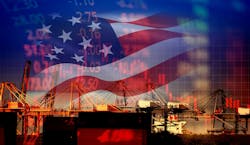PLASTICS, NAM respond to Commerce Department investigation on machinery tariffs
The Plastics Industry Association (PLASTICS) and the National Association of Manufacturers (NAM) are warning of potential harm to domestic manufacturers if additional tariffs are imposed on imports of industrial machinery and robots.
The Commerce Department is investigating whether these imports constitute a threat to national security, under Section 232 of the Trade Expansion Act of 1962, and is seeking comments by Oct. 17 at www.regulations.gov.
“The Plastics Industry Association strongly supports President Trump’s commitment to strengthening American manufacturing and revitalizing the nation’s industrial base,” PLASTICS President and CEO Matt Seaholm said in a statement.
“However, the recent expansion — and potential for additional tariffs under Section 232 — could impose steep costs on the machinery essential to producing medical devices, automotive parts, semiconductors, packaging, aerospace and defense systems, consumer goods and construction materials.
“Because plastics are a critical link across all these industries, tariffs on the equipment that keeps them running risk slowing investment, threatening jobs and undermining the broader goal of a strong American manufacturing resurgence,” Seaholm said.
In a poll on Plastics Machinery & Manufacturing’s website earlier this year, processors said tariffs were already negatively impacting their businesses. And in August, PLASTICS chief economist Perc Pineda described the negative effect of expanded Section 232 steel and aluminum tariffs across the plastics industry value chain.
“Manufacturers are working to increase capacity in the United States — and domestic production of robotics and industrial machinery can enhance both our industrial might and our national security. However, tariffs on critical manufacturing inputs would significantly increase costs on equipment and machinery on factory floors across the country, which could in turn stall investment in new plants and equipment right here at home at a time when manufacturers want to help President Trump create more U.S. manufacturing output and jobs,” NAM President and CEO Jay Timmons said in a statement.
“The challenge facing the United States today is that our domestic industry can produce at most 84 percent of the inputs manufacturers need to build, modernize and operate our facilities and to increase production and output. That is true even if every manufacturer in the country is working at full capacity,” he said. “That means that, at an absolute minimum, 16 percent of critical manufacturing inputs must be imported to manufacture more here in the U.S. That’s why manufacturers have offered practical pro-growth solutions to bring in these essential inputs without adding cost burdens, while rewarding manufacturers that invest, expand and create new jobs at home.”
About the Author
Lynne Sherwin
Managing Editor
Managing editor Lynne Sherwin handles day-to-day operations and coordinates production of Plastics Machinery & Manufacturing’s print magazine, website and social media presence, as well as Plastics Recycling and The Journal of Blow Molding. She also writes features, including the annual machinery buying survey. She has more than 30 years of experience in daily and magazine journalism.
